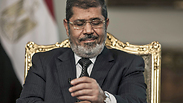
Ousted Egypt president Mohamed Morsi
צילום: EPA
2013's key events in Arab world
Ynet correspondent Roi Kais speaks with citizens of Arab countries who share their views on key events in 2013's Arab world. On top of list – Morsi's ouster, Syria crisis
2013 was extremely turbulent in the Arab world, as the Egyptian ruler was toppled, the war in Syria continued to claim lives, Lebanon increasingly faces terror, and Jordan has been struggling to harbor the flow of Syrian refugees.
Ynet correspondent Roi Kais spoke with citizens of Arab countries in an attempt to ascertain the region's most meaningful moments.
Related stories:
Egypt
Hiba Hamdi Abu Sayef, 27, a resident of Giza, Egypt, said that for her, the most significant event of 2013 was "most obviously, the second revolution in Egypt. It's not only the most important event in the Arab world, but also the most important event in the whole world. And it is still ongoing."
According to Abu Sayef, "the use of chemical weapons in Syria is a war crime and I'm sorry to say but it's a known fact that war crimes are taken place every year, even by the Israelis on the Palestinians, and every year human rights are violated.
"The nuclear deal with Iran was a deal everyone was expecting. It was obvious that eventually a deal would be reached. But the revolution in Egypt was surprising to everyone.
"No one – no politician, state, or analyst would guess that another revolution would take place in Egypt during such a short period of time. Secondly, we're talking about a country that is considered the most powerful Arab nation."
Syria
A human rights activist who requested to remain anonymous told Ynet that for him, the most prominent event of 2013 was undoubtedly the Egyptian military coup and the ouster of the Muslim Brotherhood. He noted that the Egyptian revolution will change the face of Egypt.
The activist also mentioned "the international community's abandonment of the Syrian people," noting most specifically the US, which "was satisfied with Assad's dismantling of chemical weapon after he executed the most heinous crimes against his people, and despite all the promises made by Barack Obama, who said he would not allow that weapons be used against civilians, he did not keep any of his promises. That encouraged the criminal Bashar Assad to continue his nefarious war against the Syrian people."
A representative of the Syrian opposition added the Arab world's disregard of the plight of the Syrian people and the country's bloodshed.
Not only are they ignoring it, they also support the criminal Assad, rejecting the Syrian people and closing doors in their faces even though they are killed or are dying of cold or hunger."
Iraq
The most significant event of 2013 in the eyes of Salo Saler, 26, a Kurdish student in Erbil, Iraq, was the Syrian conflict. According to him, "Syria is torn between Russia, which doesn’t want to lose its last ally in the Middle East, and the rest of the world. As a result, tens of thousands of Syrians are murdered and hundreds of thousands are displaced."
Saler noted that Morsi's ouster was not more important this year than the Syrian story. In general, citizens in the Mideast are not used to democracy. As far as I'm concerned, the massacre in Syria and the fact that Assad continues to stay strong is the biggest and most surprising thing."
Jordan
A political commentator who preferred to remain anonymous told Ynet that in his opinion, the most significant event of 2013 was the Egyptian military's coup against President Mohamed Morsi."
According to him, the coup sends Egypt back in time, as "the revolution was taken out of the hands of Egyptian revolutionaries."
Saudi Arabia
Hussein, a Saudi citizen, said that almost every Arab nation witnessed a significant event over the past year, but Morsi's ouster was the key event, because "Egypt is the biggest and most important Arab nation. What the Egyptian army did was good for the Middle East."
He also addressed the change in the Saudi nation's ties with the US, saying that in 2013, "the ties between the two nations have grown cold, especially due to Washington's stance in the issue of Iran's nuclear program and Obama's silence in regard to the Syrian regime's use of chemical weapons.
"In my humble opinion, (US President Barack) Obama is a disaster to the United States' allies in the region, most specifically Saudi and Israel.
- Receive Ynetnews updates directly to your desktop











